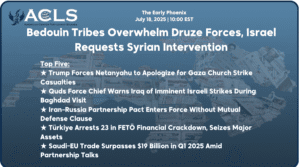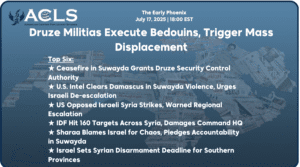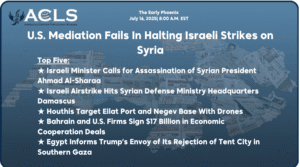TOP HEADLINES
- Massive US Military Deployment to Middle East in Response to Escalating Iran Tensions
- Netanyahu’s Bold Stance: Ready for Unprecedented Palestinian Concessions for Saudi Deal
- Turkiye’s Baykar Collaborates with Saudi Arabia on Strategic UAV Deal for Defense Localization
- High-Level Iraqi Military Delegation Visits US to Discuss Security Cooperation
- Saudi Aramco Records Decrease in Q2 2023 Net Income Amidst Lower Crude Oil Prices
TURKIYE
- Turkish Foreign Minister Stresses Turkiye’s Vital Role for EU’s Global Influence (Hurriyet Daily News). Turkish Foreign Minister Hakan Fidan stressed Turkiye’s pivotal role for the EU’s global influence during the 14th Ambassadors Conference in Ankara. Fidan advocated for a visionary approach to Turkiye-EU relations, highlighting the importance of full membership and the revival of the accession process. He asserted that the EU’s global impact relies on Turkiye’s involvement. Fidan also addressed the stalled grain deal in Ukraine, reaffirming Turkiye’s commitment to ending the conflict and resolving the global grain crisis. He expressed Turkiye’s aspiration to promote global justice, peace, security, and stability through cooperation with other nations. Fidan emphasized maintaining positive relations with Greece and urged mutual sincerity in the Aegean region.
- Turkiye’s Baykar Signs Strategic UAV Deal with Saudi Arabia to Boost Defense Localization (Daily Sabah). Turkiye’s Baykar and Saudi Arabia sign a strategic deal to localize UAV manufacturing, enhancing Saudi Arabian Military Industries’ (SAMI) role in the defense sector. The agreement includes technology transfer and follows a recent historic drone deal. Aselsan and Roketsan also signed agreements with Saudi Arabia’s NCMS, strengthening Turkish-Saudi defense cooperation.
- Türkiye Considers Gold Import Quota to Improve Deficit and FX Reserves (Reuters). Turkiye is contemplating the implementation of a quota on unprocessed gold imports to mitigate their impact on the current account balance and promote domestic production and exports. The move, primarily targeting Borsa Istanbul Stock Exchange members involved in precious metal brokerage, aims to curb the negative effects of increased raw gold imports on foreign trade and credit of payments. This initiative is anticipated to contribute to reducing the foreign trade deficit and enhancing Turkiye’s foreign exchange reserves, while certain import categories remain exempt.
- Greek Concerns Mount as Türkiye’s Missile Capabilities and Aerial Prowess Raise Alarms (Yeni Safak). Amid increasing worries about Türkiye’s advancing missile capabilities, Greek media has focused on the country’s potent defense industry, particularly highlighting missile systems like Cyclone, Lightning, Bora, and Typhoon. These systems, with varying ranges, have raised concerns that Greek islands could be within striking distance, prompting calls for strategic defense measures. The possession of an air tanker with in-flight refueling capabilities has further fueled apprehension, intensifying the push for Greek government action to counter the evolving security landscape.
ISRAEL AND PALESTINIAN TERRITORIES
- PM Netanyahu Indicates He Would Make Concessions to Palestinians to Achieve Saudi Deal (Times of Israel). In an interview released Monday, Prime Minister Benjamin Netanyahu indicated he was open to gestures to Palestinians if a normalization deal with Saudi Arabia depended on it. He hinted that he would not let coalition members block an agreement. “Do I think it’s feasible to have that, and do I think political questions will block it? I doubt it,” Netanyahu told Bloomberg News. “If there’s political will, there will be a political way to achieve normalization and a formal peace between Israel and Saudi Arabia.
- Netanyahu Envisions Economic Corridor with Saudi Arabia (AlKhaleej Online). Israeli Prime Minister Benjamin Netanyahu has proposed the establishment of an economic corridor between Israel and Saudi Arabia that could include energy, transportation, and communication technology, even if formal diplomatic recognition is not exchanged between the two countries. Netanyahu stated that such an economic initiative could yield substantial economic benefits for investors. He expressed optimism that if there is a political desire, normalization and official peace could be achieved between the two nations. This comes amid reports suggesting that a peace agreement between Israel and Saudi Arabia might require significant concessions from Israel, a prospect that could face challenges in Netanyahu’s current government.
- London Hedge Funds Raise Concerns Over Israel’s Political Turmoil Impact on Risk Premium and Credit Ratings (Times of Israel). London hedge funds and asset managers express unease over Israel’s ongoing political uncertainty, leading to discussions about Israel’s risk premium and potential effects on credit ratings. Bank Hapoalim’s chief strategist, Modi Shafrir, highlights how political developments and the uncertainty surrounding the appointment of the next Bank of Israel governor are influencing Israel’s risk premium and overall economic outlook. Geopolitical risk and concerns about the government’s judicial overhaul are causing fluctuations in market sentiment, with potential implications for Israel’s credit rating and investment climate.
- Israel’s Supreme Court to Convene Expanded Panel for Appeals Against Law Affecting Netanyahu’s Eligibility (The Siasat Daily). Israel’s Supreme Court announces that an expanded panel of 11 justices will hear appeals against a recently-passed law altering the criteria for declaring Prime Minister Benjamin Netanyahu ineligible for office. The court instructs the state to address concerns about the law’s potential to benefit Netanyahu and to explain why it shouldn’t take effect until after the next elections. The law, passed by Netanyahu’s coalition, changed conditions for declaring a prime minister unfit, sparking petitions and protests amid broader attempts to reshape Israel’s legal system.
- OIC Condemns Israeli Actions in West Bank, Urges International Intervention (Arab News). The Organization of Islamic Cooperation (OIC) denounced the killing of three Palestinians by Israeli forces in the West Bank and condemned the rise of organized terrorism by Israeli settler groups against Palestinians. The OIC called for international intervention to halt ongoing Israeli actions in the occupied Palestinian territory, hold perpetrators accountable, and provide protection for Palestinians. Additionally, a Palestinian teenager who was shot by Israeli troops after throwing a firebomb at soldiers last week in the West Bank has died, according to the Palestinian Health Ministry.
- Netanyahu Urges US Democrats to Consider Military Action Against Iran, Collaborate on AI Development (Times of Israel). Israeli Prime Minister Benjamin Netanyahu met with a US Democratic Congressional delegation and stressed the necessity of a credible military threat against Iran to prevent its nuclear ambitions. He also called for joint leadership between Israel and the US in advancing artificial intelligence (AI) capabilities, while emphasizing the need to address the potential risks and benefits of AI technology. Netanyahu highlighted the significance of innovation and collaboration among free nations to ensure positive outcomes from AI advancements.
- Settler Violence Fuels Palestinian Terrorism, says Israeli Military Spokesman (Times of Israel). Israeli military spokesman Rear Adm. Daniel Hagari stated that the recent surge in settler violence against Palestinians in the West Bank has been contributing to an increase in Palestinian acts of terror. Hagari emphasized that such “nationalist crime and nationalist terror” push some Palestinians who are not involved in terrorism towards radicalization. He stressed the need to address this phenomenon to mitigate the overall level of terrorism and enhance security. The UN reported nearly 600 attacks on Palestinians and their property by settlers in the past six months.
EGYPT & NORTH AFRICA
- President of Libyan Presidential Council Meets with Field Marshal Haftar to Discuss Elections and Security Challenges (Lana.Gov.Ly). The President of the Libyan Presidential Council, Muhammad Al-Manfi, held a meeting with Field Marshal Khalifa Haftar in Benghazi. The discussions centered around creating favorable conditions for upcoming parliamentary and presidential elections, as well as addressing national security challenges along the Libyan border. Al-Manfi’s visit to Benghazi included an inspection of development projects and their requirements ahead of a financial committee meeting.
- Libyan Protests Erupt Over Naval Base Decision Amidst Turkish Forces Presence (Only Lebanon). Protests surged in western Libya as citizens denounced the decision by the Military Prosecutor of the “National Unity” government to integrate the Al-Khums sea port into a naval base controlled by Turkish forces. Residents of Al-Khums expressed anger by setting fires and blocking roads, demanding Prime Minister Abdul Hamid al-Dabiba reverse the decision. Speaker of the House of Representatives, Aqila Saleh, deemed the move “null and illegal.”
- Violence Escalates in Sudan’s Capital Amid Clashes Between Army and Rapid Support Forces (Al-Sharq Al-Awsat). Artillery shelling erupted from the Karari military area in Sudan’s Omdurman city as the army targeted the positions of the Rapid Support Forces. The latter had laid siege to key locations in southern Khartoum and Omdurman. Clashes in central neighborhoods of Omdurman were reported, with residents demanding the prime minister reverse the decision to integrate the Al-Khums sea port into a naval base controlled by Turkish forces. Witnesses noted market closures due to looting fears, urging the “rapid support” forces to allow essential supplies. Despite ceasefire attempts, daily battles continue, raising concerns of a prolonged civil war. The conflict has displaced millions and caused widespread destruction.
- Egypt’s Foreign Currency Reserves Increase to $34.878 Billion in July (Sada Misr). The Central Bank of Egypt has reported a rise in the net cash reserves of foreign currencies by approximately $72 million in July 2023. The reserves reached around $34.878 billion by the end of July, compared to about $34.81 billion at the end of June. Egypt’s foreign reserves encompass a variety of major international currencies, including the US dollar, euro, pound sterling, Japanese yen, and Chinese yuan, following a strategy outlined by the Central Bank.
The GULF REGION & YEMEN
- UAE-Backed Group Launches Campaign Against Al-Qaeda in Yemen’s South (The New Arab). The Southern Transitional Council (STC), a secessionist group supported by the UAE, has initiated a large-scale campaign against Al-Qaeda in Yemen’s southern regions. The campaign aims to track down terrorist elements in valleys, mountains, and remote areas of Abyan province’s Mudiyah district…This move follows a series of suspected Al-Qaeda attacks, including an attack in Mudiyah district that killed two STC fighters and another attack in Wadi Omran that killed five STC fighters. Al-Qaeda’s activities have increased in the southern regions of Yemen over the past year.
- Saudi Aramco Reports Decline in Q2 2023 Net Income (France 24). Saudi Aramco, the state-owned oil company of Saudi Arabia, announced a decline in net income for the second quarter of 2023. The company’s net income amounted to 112.81 billion Saudi riyals (approximately 30.08 billion US dollars), compared to 181.64 billion Saudi riyals (approximately 48.44 billion US dollars) in the same quarter of 2022. The decrease is attributed to lower crude oil prices and weak refining and chemicals profit margins. This decline follows a previous drop in the first quarter of 2023 and is in line with market expectations. Saudi Aramco’s production has also been impacted by cuts in supplies as part of efforts to support oil prices. The company’s CEO, Amin Nasser, highlighted its resilience and ability to adapt during market volatility.
- Egypt and Saudi Arabia Urged to Collaborate in Hydrogen Market (Al Sharq Al Awsat). The Chairman of the Board of Directors of the Egyptian Hydrogen Company, Eng. Khaled Naguib, has urged Egypt and Saudi Arabia to establish the groundwork for a hydrogen market in the region, aiming to secure a significant market share in this promising sector. Naguib emphasized that such collaboration could capture about a third of the market share in both the European and Asian markets, totaling between $50 to $100 billion annually within the next 3 to 5 years. The global hydrogen market, valued at approximately $150 billion in 2020, is projected to reach $600 billion by 2050. Naguib also estimated the current value of the Egyptian hydrogen sector to be between $200 to $300 billion. He emphasized that integrating Egypt and Saudi Arabia in this emerging market would have far-reaching economic implications, especially considering Europe’s keen interest in energy imports from Egypt and Asia’s reliance on Riyadh’s energy resources.
IRAN
- Iran’s Foreign Minister Visits Japan Amidst Concerns Over Arms Supplies to Russia (New Arab). Hossein Amir-Abdollahian, Iran’s foreign minister, has embarked on a rare trip to Japan, marking his first visit to a G7 member country since 2019. The purpose of the visit to the G7’s current chair has not been officially disclosed; however, reports suggest that Japan aims to address Iran’s alleged supply of arms to Russia. The visit comes as Iran’s role in the supply of attack drones to Ukraine’s Odesa region raises concerns. Amir-Abdollahian’s discussions with Japanese officials also touched on the Iran nuclear accord, regional security, and diplomatic relations. This visit highlights the complex geopolitical landscape and diplomatic efforts between Iran and global powers.
- 3,000 US Forces Deployed to the Middle East Amid Escalating Tensions with Iran (Iran International). Over 3,000 US sailors and marines from the Bataan Amphibious Ready Group and 26th Marine Expeditionary Unit have arrived in the Middle East in response to heightened tensions with Iran. The deployment aims to showcase maritime strength and deter potential aggression. As Iran showcases new maritime weaponry and tensions rise, the US Navy’s assertive posture reinforces security in the volatile region, including the vital Strait of Hormuz. Additionally, the Biden administration’s push to address Iranian drone supplies to Russia contributes to the mounting pressure and geopolitical complexity in the area.
SYRIA
- Iran-Syria Economic Ties Strengthened Through Agreements and Collaborative Initiatives(Tehran Times). The recent landmark visit of Iran’s President Raisi to Syria has marked a new phase in the political and economic relationship between the two allies. Numerous agreements were signed, spanning banking cooperation, insurance, tourism, transportation, and free trade. This visit spurred a high-level delegation led by Syria’s Foreign Minister Faisal al-Mekdad to Iran, solidifying the commitment to enhance bilateral ties. Discussions included accelerating the implementation of agreements and expanding monetary and banking cooperation. Both nations also explored establishing a joint free trade zone in Syria and expanding agricultural collaboration, with Iran offering its advanced agricultural knowledge and technologies to Syria.
IRAQ
- Iraqi Defense Minister Leads Delegation to US for Bilateral Security Talks (Al Nahar).A senior Iraqi military delegation, led by Defense Minister Thabet Muhammad al-Abbasi, has begun an official visit to the United States at the invitation of the Pentagon. The delegation includes prominent figures such as Lieutenant General Abdul-Wahhab al-Saadi and Lieutenant General Abdul Amir Rashid Yarallah, among others. The purpose of the visit is to discuss the future relationship between the international coalition and Iraq, as well as bilateral security cooperation. The delegation will engage in a series of meetings with US Department of Defense officials to explore mutual interests and exchange intelligence information, particularly regarding counterterrorism efforts against groups like ISIS.
- Iran Announces Partial Payment of Gas Debt by Iraq, Technical Talks to Continue (Al Iraq News). Iran’s Ministry of Foreign Affairs disclosed that Iraq has fulfilled a portion of its gas debt payments to Iran. The ministry confirmed the transfer of these funds to a third country, while highlighting that technical discussions will persist. This follows earlier news from July 3, 2023, when the head of the Iranian-Iraqi Chamber of Commerce, Yahya Al-Ishaq, declared that Iraq had settled its entire outstanding debt to Iran, totaling $10 billion.
LEBANON
- Lebanon Reassures Arab Nations Amid Embassy Warnings Over Ain al-Hilweh Events (Al Jazeera). Lebanon’s caretaker Interior Minister, Bassam Mawlawi, has affirmed his country’s commitment to the safety of Arab and foreign nationals. In response to warning statements from several countries regarding the security situation following the events at Ain al-Hilweh camp, Mawlawi expressed, “We assure the embassies of Arab countries that we maintain the security of Arab nationals.” He emphasized the significance of the statements from Arab nations and underlined that Lebanon’s security data do not indicate a widespread escalation beyond Ain al-Hilweh. The government’s efforts to ensure stability and protect citizens, tourists, and foreign nationals continue amidst the recent clashes in the camp.



